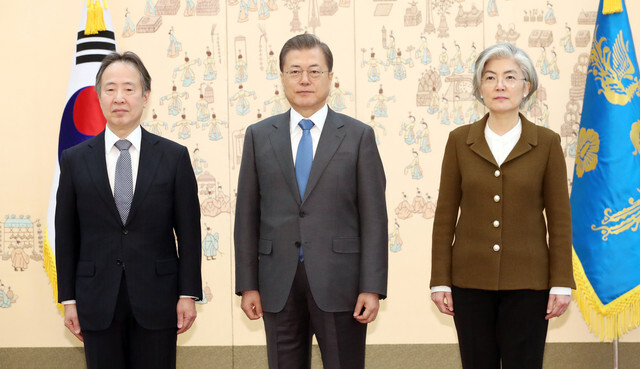hankyoreh
Links to other country sites 다른 나라 사이트 링크
S. Korean government again deliberates on whether to terminate GSOMIA

As Japan continues to play for time by hesitating to lift export controls against South Korea, some members of the South Korean government are arguing that the two countries’ information-sharing agreement should be terminated as originally planned. Seoul suspended its termination of the General Security of Military Information Agreement (GSOMIA) on the condition that the export controls be withdrawn. More specifically, the suspension was predicated on a return to the situation prior to July 1, 2019, which would mean re-adding South Korea to Japan’s white list of preferred trade partners and fully removing all the controls on exports of key materials for the semiconductor industry. So far, Seoul says, Japan’s measures have been inadequate.
On Feb. 12, the South Korean government repeated its request for Japan to remove its export controls on South Korea, emphasizing that its postponement of the GSOMIA termination had been “conditional.”
“Once again, we call upon the Japanese government to quickly repeal the export controls it imposed upon us, in line with the spirit of the bilateral agreement that we reached on Nov. 22, 2019,” said an official with South Korea’s Ministry of Foreign Affairs.
For about three months following South Korea’s conditional postponement of the GSOMIA termination, the two countries discussed pressing issues, including the export controls, through various dialogue channels, but Japan hasn’t made any noticeable changes. A director-general-level meeting was held to discuss export management policy on Dec. 16, 2019, but no further talks have been arranged since then.
“We are making improvements to the issues raised by Japan in terms of the export management system, yet Japan has not adopted any visible measures,” a South Korean government official said.
“Japan appears to be dragging things out because of the lack of progress [desired by Tokyo] on the forced labor mobilization issue,” the official suggested.
The Blue House has also reportedly been discussing the questions of how long to wait for a resolution from Japan and whether to once again raise the specter of GSOMIA’s termination. At the time Seoul moved to conditionally postpone the GSOMIA termination on Nov. 22 of last year, it did not set any deadline for Japan to complete its measures to withdraw the export controls. Internally, however, it was suggested that anything longer than three months would be unacceptable -- which would mean the “deadline” comes at the end of this month.
Kang Kyung-wha says S. Korea has “right” to terminate GSOMIAMeeting with reporters on Feb. 12, a Blue House senior official said the “question of whether to end GSOMIA is not really being discussed again.” But behind the scenes, Seoul is reportedly urging Japan to change its stance, sending the message that Tokyo needs to show “good faith” for the postponement of the GSOMIA termination to continue. In a press conference on Feb. 6, Minister of Foreign Affairs Kang Kyung-wha said, “We have the right to proceed with the GSOMIA termination at any time, and we plan to exercise that right based on what it is in the national interest.”
Along the same lines, National Security Office Second Deputy Chief Kim Hyun-chong and Secretary for Peace Planning Choi Jong-geon reportedly discussed Japan’s “failure to honor its pledge” with US officials during a recent visit to Washington, DC.
Kang is currently scheduled to attend the Munich Security Conference (MSC) on Feb. 14-16. Observers are looking to the possibility of a meeting between her and Japanese counterpart Toshimitsu Motegi for more advanced discussions on the export control issue.
By Kim So-youn and Kim Eun-hyoung, staff reporters
Please direct comments or questions to [english@hani.co.kr]

Editorial・opinion
![[Guest essay] Preventing Korean Peninsula from becoming front line of new cold war [Guest essay] Preventing Korean Peninsula from becoming front line of new cold war](https://flexible.img.hani.co.kr/flexible/normal/500/300/imgdb/original/2024/0507/7217150679227807.jpg) [Guest essay] Preventing Korean Peninsula from becoming front line of new cold war
[Guest essay] Preventing Korean Peninsula from becoming front line of new cold war![[Column] The state is back — but is it in business? [Column] The state is back — but is it in business?](https://flexible.img.hani.co.kr/flexible/normal/500/300/imgdb/original/2024/0506/8217149564092725.jpg) [Column] The state is back — but is it in business?
[Column] The state is back — but is it in business?- [Column] Life on our Trisolaris
- [Editorial] Penalties for airing allegations against Korea’s first lady endanger free press
- [Editorial] Yoon must halt procurement of SM-3 interceptor missiles
- [Guest essay] Maybe Korea’s rapid population decline is an opportunity, not a crisis
- [Column] Can Yoon steer diplomacy with Russia, China back on track?
- [Column] Season 2 of special prosecutor probe may be coming to Korea soon
- [Column] Park Geun-hye déjà vu in Yoon Suk-yeol
- [Editorial] New weight of N. Korea’s nuclear threats makes dialogue all the more urgent
Most viewed articles
- 1[Guest essay] Preventing Korean Peninsula from becoming front line of new cold war
- 2Yoon’s broken-compass diplomacy is steering Korea into serving US, Japanese interests
- 360% of young Koreans see no need to have kids after marriage
- 4[Reporter’s notebook] In Min’s world, she’s the artist — and NewJeans is her art
- 5After 2 years in office, Yoon’s promises of fairness, common sense ring hollow
- 6S. Korean first lady likely to face questioning by prosecutors over Dior handbag scandal
- 7[Column] Why Korea’s hard right is fated to lose
- 8AI is catching up with humans at a ‘shocking’ rate
- 9[Column] The first year of war in Ukraine
- 10‘Weddingflation’ breaks the bank for Korean couples-to-be